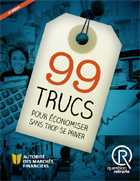7 types of documents you’ll need as you approach retirement
Are you nearing retirement? Now’s the time to gather and organize your important financial documents, including:
- Your bank, credit card and other loan statements
- Your investment statements, investor profile and tax records
- Your statements of participation in the Québec Pension Plan (QPP) and private pension plans.
- Your insurance contracts
- Your will and cohabitation agreement or marriage contract
- Your power of attorney and protection mandate (mandate in case of incapacity)
- Your balance sheet, budget, drawdown plan or complete financial plan
1. Your bank, credit card and other loan statements
Determine whether you’ll still be carrying debts when you retire and assess their impact on your income. You might want to make an extra effort to pay them off as soon as possible. Prepare a realistic repayment plan.
2. Your investment statements, investor profile and tax records
Check your RRSP, VRSP and TFSA contribution room. If you can afford to contribute advantageously to these tax-savings vehicles, then make the most of them! You can contribute to your RRSP until December 31 of the year in which you turn 71, even while you’re retired.
Since you’re nearing retirement, you’ll probably need a portion of the invested money within the next few years. Make sure your investor profile reflects this and that you limit your investment risk accordingly. If you need to, use the AMF’s on-line investor profile questionnaire. This tool automatically isolates the amounts you’ll need in the next few years, while determining your investor profile for the remaining amounts. If necessary, meet with your representative to review your investments.

Money saving tips
To help you save money, follow the tips contained in the guide 99 trucs pour économiser sans trop se priver! (pdf - 6 MB)This link will open in a new windowUpdated on June 17, 2022 (in French only).
3. Your statements of participation in the Québec Pension Plan (QPP) and private pension plans.
You can consult your QPP statement by using the My Account This link will open in a new window on-line service on the Retraite Québec website. Check any private pension plan statements you may have, as well. Your statements will give you a good idea of the amounts you’ll be receiving. Make sure those amounts match the projections in your retirement plan.
4. Your insurance contracts
You may hold several insurance contracts. Make sure they still serve a purpose. If any insurance contracts terminate at retirement, plan on replacing the insurance you need. Since the cost of some types of insurance increases at retirement, consider the various insurance features you require and then shop around for the best price.
5. Your will and cohabitation agreement or marriage contract
Your will should always be up-to-date, regardless of your age. If you’ve had more than one spouse during your lifetime, make sure you’ve made the necessary changes to your papers as they won’t be made automatically!
6. Your power of attorney and protection mandate (mandate in case of incapacity)
A power of attorney is a mandate authorizing a person to manage some of your affairs (such as paying bills, voting at meetings and signing contracts). In the event of incapacity, a power of attorney becomes invalid, at which point the protection mandate takes effect — if you have one!
If you don’t have a protection mandate, draw one up while you’re still able. Don’t wait until you’re incapacitated! For more information, consult the Asking someone to manage your affairs page.
7. Your balance sheet, budget, drawdown plan or complete financial plan
You’ll probably need help from a specialist to get the most out of your retirement funds. To build an effective drawdown plan, you’ll need to take into account not only the taxes you’ll be paying in retirement, but also the income you’ll be receiving under the various government programs. For example, would it be more advantageous to take the money out of your RRSPs or TFSA first or to use amounts held outside of those plans? Check whether withdrawing funds from your RRSP could reduce the level of income you receive from either the Guaranteed Income Supplement or the Old Age Security pension.
You’ll also have to determine the age at which you should apply to receive the Québec Pension Plan pension and Old Age Security pension. The longer you wait, the higher your pension.
Two tips to end
- Keep your documents safely stored!
Tell some of your trusted friends and family members where your documents are stored. The names of your financial institutions, the contact information of your notary/lawyer, accountant and representative, and any other important information that a close friend or family member may need in order to track down your documents should be kept in the same place as your papers. - Register for a retirement preparation course
A retirement preparation course covers all the areas listed above as well as the psychosocial aspects of retirement. It’s a good opportunity to give some thought to the big decision of when to retire. Do you wish to take such a course? Inquire with the various educational institutions in your community. You could gain some invaluable insight.
